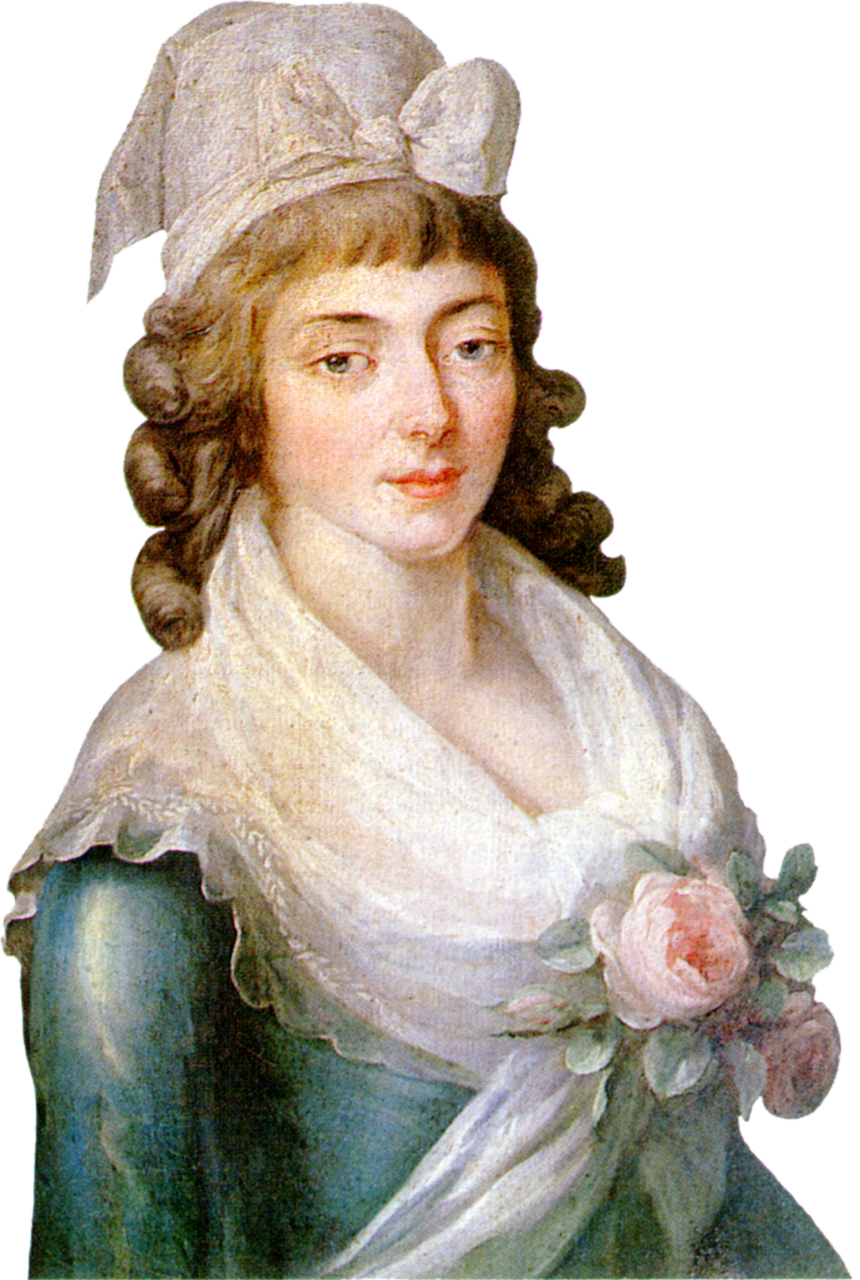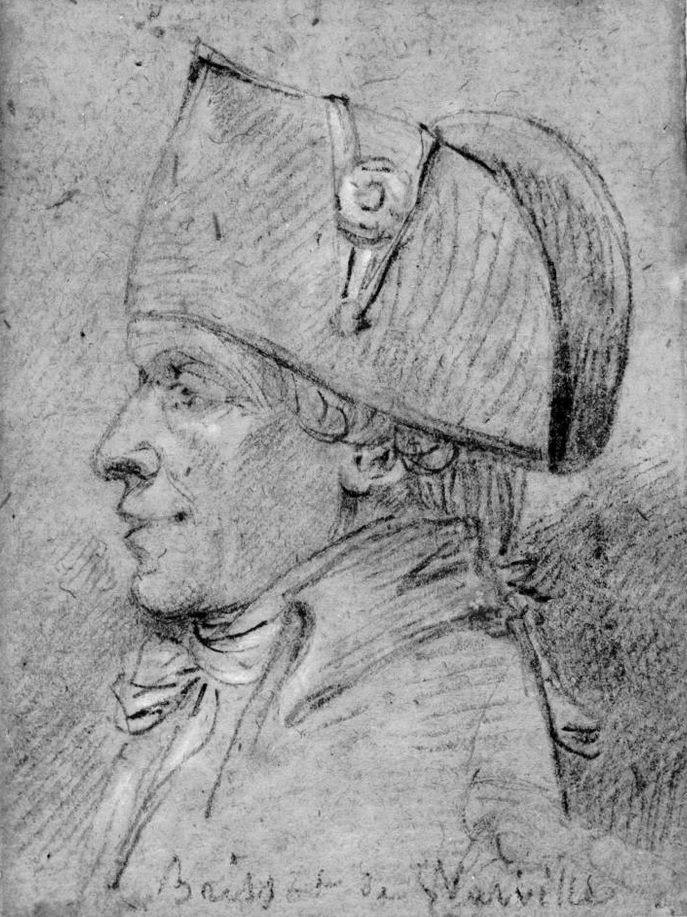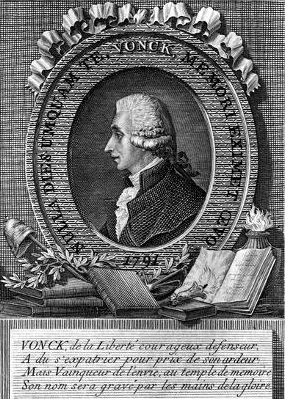|
Girondin
The Girondins (, ), also called Girondists, were a political group during the French Revolution. From 1791 to 1793, the Girondins were active in the Legislative Assembly and the National Convention. Together with the Montagnards, they initially were part of the Jacobin movement. They campaigned for the end of the monarchy, but then resisted the spiraling momentum of the Revolution, which caused a conflict with the more radical Montagnards. They dominated the movement until their fall in the insurrection of 31 May – 2 June 1793, which resulted in the domination of the Montagnards and the purge and eventual mass execution of the Girondins. This event is considered to mark the beginning of the Reign of Terror. The Girondins were a group of loosely affiliated individuals rather than an organized political party and the name was at first informally applied because the most prominent exponents of their point of view were deputies to the Legislative Assembly from the département o ... [...More Info...] [...Related Items...] OR: [Wikipedia] [Google] [Baidu] |
Jacobins
The Society of the Friends of the Constitution (), renamed the Society of the Jacobins, Friends of Freedom and Equality () after 1792 and commonly known as the Jacobin Club () or simply the Jacobins (; ), was the most influential List of political groups in the French Revolution, political club during the French Revolution of 1789. The period of its political ascendancy includes the Reign of Terror, during which well over 10,000 people were put on trial and executed in France, many for "political crimes". Initially founded in 1789 by Criticism of monarchy, anti-royalist deputies from Duchy of Brittany, Brittany, the club grew into a nationwide Republicanism, republican movement with a membership estimated at a half million or more. The Jacobin Club was heterogeneous and included both prominent parliamentary factions of the early 1790s: The Mountain and the Girondins. In 1792–93, the Girondins were more prominent in leading France when they French Revolutionary Wars, declared ... [...More Info...] [...Related Items...] OR: [Wikipedia] [Google] [Baidu] |
Jacques Pierre Brissot
Jacques Pierre Brissot (, 15 January 1754 – 31 October 1793), also known as Brissot de Warville, was a French journalist, abolitionist, and revolutionary leading the political faction, faction of Girondins (initially called Brissotins) at the National Convention in Paris. The Girondins favored exporting the revolution and opposed a concentration of power in Paris. He collaborated on the Mercure de France and the ''Courier de l'Europe'', which sympathized with the insurgents in the American colonies. In February 1788, Brissot founded the anti-slavery Society of the Friends of the Blacks. With the outbreak of the French Revolution, revolution in July 1789, he became one of its most vocal supporters. As a member of the Legislative Assembly (France), Legislative Assembly, Brissot advocated for war against Austria and other European powers in order to secure France's revolutionary gains, which led to the War of the First Coalition in 1792. He voted against the immediate execution of ... [...More Info...] [...Related Items...] OR: [Wikipedia] [Google] [Baidu] |
National Convention
The National Convention () was the constituent assembly of the Kingdom of France for one day and the French First Republic for its first three years during the French Revolution, following the two-year National Constituent Assembly and the one-year Legislative Assembly. Created after the great insurrection of 10 August 1792, it was the first French government organized as a republic, abandoning the monarchy altogether. The Convention sat as a single-chamber assembly from 20 September 1792 to 26 October 1795 (4 Brumaire IV under the Convention's adopted calendar). The Convention came about when the Legislative Assembly decreed the provisional suspension of King Louis XVI and the convocation of a National Convention to draw up a new constitution with no monarchy. The other major innovation was to decree that deputies to that Convention should be elected by all Frenchmen 21 years old or more, domiciled for a year and living by the product of their labor. The National Convent ... [...More Info...] [...Related Items...] OR: [Wikipedia] [Google] [Baidu] |
The Mountain
The Mountain () was a political group during the French Revolution. Its members, called the Montagnards (), sat on the highest benches in the National Convention. The term, first used during a session of the Legislative Assembly, came into general use in 1793. By the summer of 1793, the pair of opposed minority groups, the Montagnards and the Girondins, divided the National Convention. That year, the Montagnards were influential in what is commonly known as the Reign of Terror. The Mountain was the left-leaning radical group and opposed the more right-leaning Girondins. Despite the fact that both groups of the Jacobin Club had virtually no difference with regard to the establishment of the French Republic, the aggressive military intentions of the rich merchant class-backed Girondins, such as conquering the Rhineland, Poland and the Netherlands with a goal of creating a protective ring of satellite republics in Great Britain, Spain, and Italy, and a potential war with Austri ... [...More Info...] [...Related Items...] OR: [Wikipedia] [Google] [Baidu] |
The Plain
The Plain (), also known as the Marsh (), was the majority of independent deputies in the National Convention during the French Revolution. They were the most moderate and the most numerous group (around 400 deputies) of the National Convention, as they sat between the Girondins on their right and the Montagnards (the Mountain) on their left. Their name arises from the fact their benches were by the debating floor, lower down from the Montagnards. Its members were also known as ''Maraisards'', or derogatorily ''Toads'' () as toads live in marshes. Coming mostly from the liberal and republican bourgeoisie, the Plain was attached to the political conquests of 1789 and to the work of the French Revolution and wanted the union of all republicans. In practice, this group was very heterogeneous as it included noblemen and clericals like Henri Grégoire, François Antoine de Boissy d'Anglas, Jean-Jacques-Régis de Cambacérès, and Emmanuel Joseph Sieyès; at the same time, som ... [...More Info...] [...Related Items...] OR: [Wikipedia] [Google] [Baidu] |
Bordeaux
Bordeaux ( ; ; Gascon language, Gascon ; ) is a city on the river Garonne in the Gironde Departments of France, department, southwestern France. A port city, it is the capital of the Nouvelle-Aquitaine region, as well as the Prefectures in France, prefecture of the Gironde department. Its inhabitants are called "''Bordelais'' (masculine) or "''Bordelaises'' (feminine). The term "Bordelais" may also refer to the city and its surrounding region. The city of Bordeaux proper had a population of 259,809 in 2020 within its small municipal territory of , but together with its suburbs and exurbs the Bordeaux Functional area (France), metropolitan area had a population of 1,376,375 that same year (Jan. 2020 census), the sixth-most populated in France after Paris, Lyon, Marseille, Lille, and Toulouse. Bordeaux and 27 suburban municipalities form the Bordeaux Métropole, Bordeaux Metropolis, an Indirect election, indirectly elected Métropole, metropolitan authority now in charge of wi ... [...More Info...] [...Related Items...] OR: [Wikipedia] [Google] [Baidu] |
Marquis De Condorcet
Marie Jean Antoine Nicolas de Caritat, Marquis of Condorcet (; ; 17 September 1743 – 29 March 1794), known as Nicolas de Condorcet, was a French Philosophy, philosopher, Political economy, political economist, Politics, politician, and mathematician. His ideas, including support for liberal economy, free markets, Universal access to education, public education, constitutionalism, constitutional government, and Social equality, equal rights for women and people of all races, have been said to embody the ideals of the Age of Enlightenment, of which he has been called the "last witness", and Enlightenment rationalism. A critic of the constitution proposed by Marie-Jean Hérault de Séchelles in 1793, the Convention Nationale – and the Jacobin faction in particular – voted to have Condorcet arrested. He died in prison after a period of hiding from the French Revolutionary authorities. Early years Condorcet was born in Ribemont (in present-day Aisne), descended ... [...More Info...] [...Related Items...] OR: [Wikipedia] [Google] [Baidu] |
Feuillant (political Group)
The Society of the Friends of the ConstitutionIt was the original name of the Jacobin Club until its radicalization after the Republic's birth. (), better known as Feuillants Club ( ), was a political grouping that emerged during the French Revolution. It came into existence on 16 July 1791. The assembly split between the Feuillants on the right, who sought to preserve the position of the king and supported the proposed plan of the National Constituent Assembly for a constitutional monarchy; and the Jacobins on the left, who wished to press for a continuation of the overthrow of Louis XVI. It represented the last and most vigorous attempt of the moderate constitutional monarchists to steer the course of the revolution away from the radical Jacobins. The Feuillant deputies publicly split with the Jacobins when they published a pamphlet on 16 July 1791, protesting the Jacobin plan to participate in the popular demonstrations against Louis XVI on the Champ de Mars the following ... [...More Info...] [...Related Items...] OR: [Wikipedia] [Google] [Baidu] |
Armand Gensonné
Armand Gensonné (, 10 August 175831 October 1793) was a French politician. The son of a military surgeon, he was born in Bordeaux, Gascony, and studied Law before the outbreak of the French Revolution, becoming lawyer of the ''parlement'' of Bordeaux. In 1790 he became ''procureur'' of the Bordeaux Commune, and in July 1791 was elected by the newly created '' département'' of the Gironde a member of the court of appeal. In the same year he was elected deputy for the ''département'' to the Legislative Assembly. As ''rapporteur'' of the diplomatic committee, in which he supported the policy of Jacques Pierre Brissot, he proposed two of the most revolutionary measures passed by the Assembly: the decree of accusation against the King Louis XVI's brothers (the Comte de Provence and the Comte d'Artois) on 1 January 1792, and the declaration of war against the Habsburg ruler Francis II (20 April 1792). He denounced of the intrigues of the court and of the '' Comité autrichien ... [...More Info...] [...Related Items...] OR: [Wikipedia] [Google] [Baidu] |
Vonckists
The Vonckists (; French: ''Vonckistes'') or democrats (Dutch: ''democraten''; French: ''démocrates'') were a progressive political faction active in the Austrian Netherlands and later the United Belgian States during the Brabant Revolution (1789–1790). They were led by Jan Frans Vonck and were opposed to the more conservative " Statists", although they did initially ally with them for the sake of liberating the Southern Netherlands. History The group emerged from the secret society ''Pro aris et focis'' in the 1780s, and by 1789 had become a distinct faction. The Vonckists called for Belgian independence from the Habsburg monarchy under a popular government along the model seen during the French Revolution. After the proclamation of the United Belgian States in January 1790, the Vonckists were denounced as anticlerical by the Statists and many were hunted down by mobs in what was known as the "Summer Terror". Jan Frans Vonck and many other Vonckist leaders were forced int ... [...More Info...] [...Related Items...] OR: [Wikipedia] [Google] [Baidu] |






